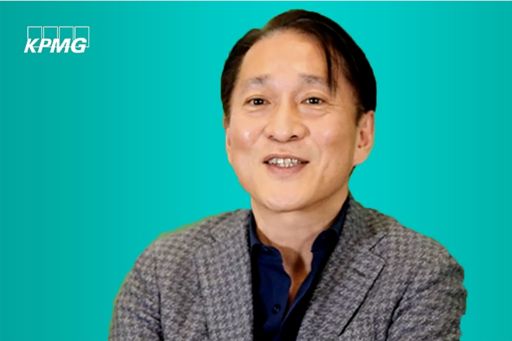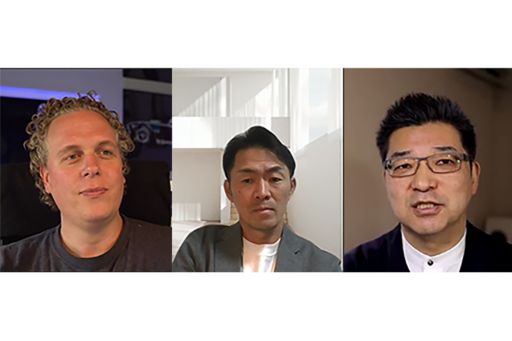Terms such as ESG, SDGs and sustainability have become actively used in corporate management and practice. And today, they are required to be presented with transparency “not as ideals or topics but as one of the important elements for enhancing corporate value.”
So, how are we going to put them into practice? As the “Pilot” of Digital Management, Masayuki Chatani and Tim Denley at KPMG Ignition Tokyo (KIT) discussed this matter with Junichi Adachi, Head of Accounting Advisory Services (AAS) at KPMG AZSA and CEO of KPMG AZSA Sustainability.
Why Is Sustainability Gaining Increasing Interest in the Economic World?

(Tim Denley, Board Member & Partner of KPMG Ignition Tokyo (top left), Masayuki Chatani, Representative Director & CEO of KPMG Ignition Tokyo and CDO of KPMG Japan (lower left), Junichi Adachi, Head of Accounting Advisory Services (AAS) at KPMG AZSA and CEO of KPMG AZSA Sustainability (right)) *Professional affiliation and official position in the article are at the time of publication.
Chatani: Before starting our discussion, let’s get a quick overview of why sustainability is gaining increasing interest in the economic world. Mr. Adachi, as you are the CEO of KPMG AZSA Sustainability, can you explain this to us?
Adachi: It is probably fair to say that this is because, as many of you already know, the raison d'être of a company is shifting from “a vessel that receives investments and provides returns to shareholders” to a way of thinking that “a company is one of the important elements of society as a whole.” Companies have started to acknowledge that they are not just involved with their direct investors but also with various other stakeholders including customers, their related parties, and their own business partners.
For companies today, “sustainability” does not only include the sustainability of their own business but also the sustainability of society itself. The behavior of companies has probably started to change because they have come to understand this. The angle of their view is starting to change to consider how they are appraised from the perspective of a third party. Until about five years ago, companies mainly expressed their vision by saying “This is what we want to be” but now they have changed their way of thinking to say “How can we get closer to what society as a whole wants us to be?”
There were several factors that led to this change but in Japan, the target of the government’s policy “to go carbon-neutral (net zero CO2 emissions) by 2050” expressed for the first time by Prime Minister Yoshihide Suga in the policy speech he made in the Diet on October 26, 2020 also had a big impact.
Meanwhile, when we look around the world, the EU has long been promoting and implementing climate control actions and the U.S. also announced its “return to the Paris climate agreement” as soon as the Biden administration took office. As you can see, the “resistance” against tackling climate change is already vanishing around the world. Economic and political movements to address climate change “as a matter of course” will no doubt accelerate far more than before.
Chatani: In which case, companies need to change their mindset more than ever.
Adachi: I think so. However, from our standpoint as an audit firm, I don’t think the desire of clients to “ensure transparency and validity” itself will change.
What will change are the elements of ESG (Environment, Society and Governance). In other words, when communicating externally about information such as the implementation of actions against climate change and human rights issues, the labor exploitation situation and diversity, we are required to provide assurance and a “seal of approval” from a third party.
I think that KPMG, which is originally an accounting firm, will be providing schemes and services to quantify things that had not been measured with monetary value in the so-called non-financial sector, in addition to the financial support that can be evaluated with numbers like accounting.
Significance of Quantifying Value in Non-financial Sector
Chatani: You talked about quantifying value in the non-financial sector but what is its significance?
Adachi: Taking the example of “CO2 emissions trading,” some people will point out that “assuring the reliability of the CO2 emissions report will also be necessary in the first place” when discussing this matter. Also, when undergoing an M&A, questions such as “whether it is acceptable to acquire a company with high CO2 emissions” are starting to be raised. In the assurance business, “the assurance of the reliability of indicated CO2 emissions” is starting to attract attention.
Overall, financial information has been emphasized in the process of evaluation, but now both financial and non-financial information will be evaluated with equal importance.

The stance of the financial industry is deeply involved behind this development and initiatives in the so-called sustainable finance domain such as the PRI (Principles for Responsible Investment) lie at its root. Fund providers such as institutional investors have started to approve of green companies and green practices and think based on the concept of not investing in so-called brown businesses that continue to have a high impact on the global environment or violate human rights such as labor exploitation and child labor. There is also an active movement to say “If you are not green, you will not get a loan or we will withdraw our investment.”
Denley: Until now, the agenda of society and companies has been oriented toward “environmental conservation and being kind to the earth” but the values themselves are changing now that the financial industry has taken a step forward in raising awareness. The strong presence of the PRI can be seen here.
Adachi: For financial institutions that are making investments, it has already become “common to sign the PRI.” As you just said, the approach to focus on the areas where the money is flowing has a great impact.
In the transition period like now, terms such as green finance and sustainability finance are also beginning to penetrate. A pension fund called “Kujira,” which is a supergiant institutional investor, is closely involved in this major movement.
Among those who are entrusting their money to the assets managed by this fund, there are many millennials and Z generation people. Their strong intentions to make green investments with longer periods cannot be ignored, and neither investors nor companies can continue their businesses unless they can respond to these expectations.
Transparency and Standardization of Non-financial Areas Going Forward

Chatani: You mentioned earlier that there is increasing interest in the CO2 emissions report, but what is behind this increasing interest?
Adachi: The COVID-19 crisis has made us realize anew that there is a “border” in terms of the movement of people. On the other hand, we became acutely aware that this “border” is diminishing in the areas of logistics, finance and sustainability. For instance, the concept of national borders does not apply to CO2, which is said to be the cause of climate change, water resources and causes of water contamination.
Chatani: Things that move physically including what you just mentioned are indeed troublesome. KIT has also started to investigate “what kind of data there are” for measuring this. We probably need to examine how we are going to handle this, as data types, evaluation methods and formulas have not yet been determined.
The financial sector, which we have been focusing on, has a history of some 100 years and therefore styles and rules are standardized. On the other hand, as mentioned earlier, these are still uncertain in the non-financial sector. I believe that the standardization of the measuring method is essential but what is your view under current circumstances?
Adachi: The need for standardization is our common view. For instance, if the standard for “what CO2 emissions are” differs, appropriate emissions trading will not be possible because “there will be gaps between CO2 emissions trading in Japan and that in other countries so these will need to be offset.”
However, de facto standards for non-financial reports have not been decided yet. Nevertheless, just as there are rules in the world of accounting, the rules for how non-financial reports should be presented will probably be determined gradually. You could say that we are now in the midst of this great transition.
When the standards for such reports are established, there is no doubt that the importance of data will increase. We have also started to work on a project to implement a “what-if” simulation with an external partner by leveraging meteorological and topographical data to evaluate physical risks (natural disasters including storms and floods) in order to publish the TCFD report. We believe that this will enable us to scientifically clarify the level of risks in specific areas.
Also, initiatives to scientifically measure climate change risks in more detail using meteorological data have already started. I believe that these are indeed actions that will complement information in the non-financial sector with technology.
Meanwhile, regarding the measurement of CO2 emissions, conventional ways of thinking are changing with the emergence of technologies which could not be anticipated before, such as CCS (Carbon Capture and Storage). As you can see, even if a measurement method is established, the emergence of technology may fundamentally overturn this way of thinking and therefore result in a somewhat cat-and-mouse game.
Data-Driven Ideas Will Support Implementation of Sustainability
Chatani: The fact that the development of technology will serve as an opportunity to change measurement methods and rules is quite different from accounting, which remained almost unchanged during its 100 years of history.
Adachi: That’s true. There are also data-driven ideas in the basis of the non-financial sector. In other words, it can be said that the approach to start with facts is what is different from the traditional approach, which starts with a hypothesis. This is why we need to think of “how we can use” facts by combining a lot of data related to nature that have been accumulated from the past.
The method used in accounting to infer anomalies and irregularities from a particular model may be applied in the environmental field as well. However, in either field, it often happens that past models can no longer be applied when there is a paradigm shift. This also means that the approach to start with facts may enable us to overcome this challenge.

Meanwhile, having been involved in the ESG domain, I feel that, to my surprise, there are “areas that are approached traditionally.” This is why I would like to bring data-driven ideas to this field, where “being scientific and having a scientific basis” are being encouraged.
Chatani: KIT Lab is also showing a strong interest in this area. Taking the warming impact for example, it was necessary to analyze an enormous amount of data including meteorological data to present a scientific view. However, with the enhancement of processing capability, it has become possible to apply these data to a broad range of areas.
Adachi: That’s true. As I mentioned earlier, if we try to do such analysis work, we may end up following conventional approaches and ways of thinking. However, properly speaking, I feel that this is something that we must address based on new ideas with a data-first approach.
Chatani: In recent years, AI has changed its style from producing answers from algorithms to producing algorithms from data. A sense of acknowledging common insights and characteristics is also demanded.
Adachi: What is interesting about this approach to analyze data and start with facts is that innocent ideas without any premise or previous knowledge can produce better solutions in many cases.
I imagine that if we gather together highly professional people, provide them with ideas and have them use their in-depth knowledge, it may be possible to raise questions and provide solutions that were unimaginable before.
Chatani: As implied by the word “unlearn,” it is important to address something by letting go of what one already knows in order to create new ideas. In this sense, as there are professionals in the fields of technology and data who can look at the sustainability sector with fresh eyes at KIT, I think we will be able to work on something together.
Adachi: To ignore the knowledge and experience we have accumulated is far more difficult than we think. For instance, as I have been in the field of accounting for many years, it is difficult for me to think by separating myself from this field. However, it has become common to think that it is better to work together by gathering many kinds of knowledge and wisdom rather than responding with one type of knowledge and wisdom in recent years. We should cultivate something better while making critical verifications.
Follow us on KPMG Ignition Tokyo LinkedIn for the latest news.
Connect with us
- Find office locations kpmg.findOfficeLocations
- kpmg.emailUs
- Social media @ KPMG kpmg.socialMedia




